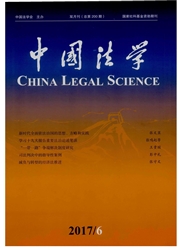

 中文摘要:
中文摘要:
《中国行政审判指导案例》第14号案例对行政机关将涉嫌犯罪的违法行为移送司法机关追究刑事责任后能否再对行政相对人作出行政处罚予以明确。根据该案判决理由,法院认定行政机关作出的行政处罚决定违法必须同时符合行为要件、时间要件以及处罚种类要件。但是在三要件的构成上,14号案例与其他规范性文件的规定存在着一定的冲突。三要件最重要的功能在于明确提出了刑事优先原则,但只是有限刑事优先,而不是绝对刑事优先。该案在案情事实中认定的行政机关的移送方式与已有的规定以及执法实践有着差异,带来了一定困惑,包括:针对涉嫌犯罪的违法行为,行政机关采取何种步骤移送;移送后行政执法应处于何种状态;移送后行政强制措施、强制执行能否实施;行政处罚与刑事处罚如何折抵。
 英文摘要:
英文摘要:
Case 14 in Guide Case in Administrative Adjudication of the People's Republic of China clarifies whether to impose administrative penalty on the concerned person who is already investigated for criminal liability after the administrative organ has transferred the case to judicial organ. Pursuant to the ratio deeidendi, the court affirms that administrative penalty decision must comply with act element, time element, and penalty type element. However, on the constitution of the three elements, there are certain conflicts between No. 14 case and provisions of other normative documents. The most important function of the three elements is that they put forward the principle of criminal priority, although a limited one. In this case, the way of transfer by administrative organ confirmed in the fact differs from existing rules and law enforcement practice, thus bring some confusions, including: what procedure the administrative organ should take to transfer the case on suspected illegal acts, in what condition administrative enforcement should be after the transfer, whether administrative coercive measure and administrative execution should be imposed after the transfer, and how to offset criminal punishment with administrative penalty.
 同期刊论文项目
同期刊论文项目
 同项目期刊论文
同项目期刊论文
 期刊信息
期刊信息
